|
|
|
Sort Order |
|
|
|
Items / Page
|
|
|
|
|
|
|
| Srl | Item |
| 1 |
ID:
190010


|
|
|
|
|
| Summary/Abstract |
Although Lord Plumer’s tenure as high commissioner for Palestine (1925–28) is sometimes characterized by mainstream Euro-American histories as a period of comparative peace, the year 1927 saw two major disruptions: the Jericho earthquake in July, which caused serious damage to towns and cities including Jerusalem, Nablus, and Lydda; and unrest among Jewish immigrants who found that the local economy had no jobs to offer them—or at least not ones at the European rates of pay to which they were accustomed. This article explores the ways in which each of these crises intersected with Palestine’s infrastructure—in particular its railways, roads, and housing stock. I argue that the disparate ways in which the British administration approached earthquake victims versus the unemployed, the help it offered (or failed to offer), and the policies it implemented are telling about the nature of British governance in Palestine in the mid-1920s and British administrative priorities and concerns. The Mandate authorities’ responses to the quake—characterized by selective negligence—reveal the colonial administration’s weakness, the contested ways in which colonial structures were shaped and operated in the early Mandate period, and the extent to which maintaining a facade before other colonial powers and the League of Nations outweighed substantive action.
|
|
|
|
|
|
|
|
|
|
|
|
|
|
|
|
| 2 |
ID:
162776
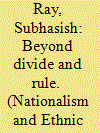

|
|
|
|
|
| Summary/Abstract |
Existing cross-national research on inter-communal violence has demonstrated that ex-British colonies are more prone to inter-communal violence than ex-colonies of other European powers. This finding has been attributed to the greater prevalence of divide-and-rule policies in ex-British colonies. This explanation is, however, incomplete since it implicitly assumes that British imperial policy profoundly transformed pre-colonial political realities. This article argues, instead, that the impact of British divide and rule strategies on subsequent inter-communal violence is crucially contingent on the level of political centralization attained by communal groups in the pre-colonial era. Drawing on a novel dataset tracking ethnic group dyads in 21 ex-British colonies across the period 1940-2006, I provide robust evidence indicating that the pathway from the experience of British colonial rule to contemporary inter-communal violence is more complex than hitherto appreciated.
|
|
|
|
|
|
|
|
|
|
|
|
|
|
|
|
| 3 |
ID:
116256
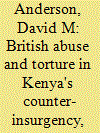

|
|
|
|
|
| Publication |
2012.
|
| Summary/Abstract |
Accusations of abuse and torture in the counter-insurgency campaign against Mau Mau rebels in Kenya were widely publicised during the 1950s. The typical British response was to issue official denials, and when prosecutions did arise the perpetrators were characterised as pathological, their behaviour presented as isolated and exceptional. New evidence found in the British colonial 'Migrated Archive' for Kenya now confirms that the practice of torture and abuse was widespread, amounting to a systematic pattern of state policy. This article rejects dispositional and individual explanations of British torture in Kenya and instead examines the violence in temporal and structural terms, showing how the toleration of violence at an early stage of the Emergency led to its institutionalisation in Kenya's detention camps at a later stage. The article offers evidence from the screening process in the first phase of the counter-insurgency campaign, and from the 'dilution technique' applied in the detention camps after 1956 in the final phase of the war to illustrate the argument. The concluding discussion explores the dilemmas confronting Kenya's colonial violence workers and their political masters as they struggled to present torture as lying within the 'rule of law'.
|
|
|
|
|
|
|
|
|
|
|
|
|
|
|
|
| 4 |
ID:
132052
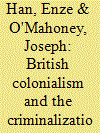

|
|
|
|
|
| Publication |
2014.
|
| Summary/Abstract |
What explains the global variation in laws criminalizing homosexual conduct? Recent research has claimed that British colonialism is largely responsible for the criminalization of homosexuality around the world. This article utilizes a newly constructed dataset that includes up-to-date data on 185 countries to assess this claim. We find that British colonies are much more likely to have criminalization of homosexual conduct laws than other colonies or other states in general. This result holds after controlling for other variables that might be expected to influence the likelihood of repressive lesbian, gay, bisexual and transgender (LGBT) rights legislation. However, we also find that the evidence in favour of the claim that British imperialism 'poisoned' societies against homosexuality is weak. British colonies do not systematically take longer to decriminalize homosexual conduct than other European colonies.
|
|
|
|
|
|
|
|
|
|
|
|
|
|
|
|
| 5 |
ID:
127143
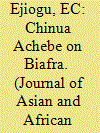

|
|
|
|
|
| Publication |
2013.
|
| Summary/Abstract |
A properly contextualized historiography in Chinua Achebe's personal history of Biafra is necessary for shaping his discourse on Biafra clearly for a better understanding. British colonial intervention was a crass endeavor that repositioned clearly distinct peoples inhabiting the parts of the Niger basin that became Nigeria in an unhealthy social, economic and political arrangement that enabled the series of unfortunate events that included the pogroms of the Igbo and, of course, the genocidal Biafra war.
|
|
|
|
|
|
|
|
|
|
|
|
|
|
|
|
| 6 |
ID:
167501
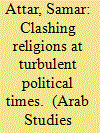

|
|
|
|
|
| Summary/Abstract |
“The Clashing Religions at Turbulent Times” describes the tragic relationship between the Islamic Civilization and the West throughout history to the present day, and the reaction of 17th-, 18th- and 19th-century writers in Britain, and the rest of Europe, to the devastating historical events and numerous translations of Arabic and Islamic sources into Latin, English and other languages. Extraordinary zeal both in politics and religion leads to nothing but bloodshed and wars, and creates eternal enmity between nations. Social, political and religious toleration is a moral virtue and an essential key to our mutual peaceful coexistence in this world.
|
|
|
|
|
|
|
|
|
|
|
|
|
|
|
|
| 7 |
ID:
113368
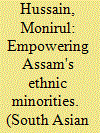

|
|
|
| 8 |
ID:
132027
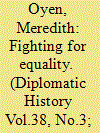

|
|
|
|
|
| Publication |
2014.
|
| Summary/Abstract |
An early battle in the war to gain greater equality for China on the international stage emerged in an unexpected place: Aboard ships around the world sailing for the Allied Merchant Marine. During the Second World War, at least twenty thousand Chinese seamen worked on mostly British ships. Chinese worked long hours, received lower wages than white sailors engaged in the same work, were never given the war risk bonus offered to keep other members of the crew on duty during periods of high risk, and were routinely denied shore leave at U.S. ports on the grounds that they posed a flight risk. In response, Chinese seamen deserted in uniquely high rates, en masse instead of one individual at a time. The nature and scope of the desertions threatened the success of the supply operation, leading the governments involved to come together to try to prevent them.This article explores the multilateral negotiations that endured as long as the war itself. These centered upon three of the most basic inequalities endured by Chinese sailors-unequal pay, lack of war risk bonuses, and lack of shore leave. Using government records from all three parties (the United States, Great Britain, and the Republic of China) as well as press and collections from private organizations, I demonstrate the ways in which racial inequalities ingrained in the international system hindered advances for the Chinese seamen, challenged the smooth management of both Anglo-Chinese and Chinese-American relations, and sparked conflict between the Nationalist Chinese government and the seamen themselves. The legacies of British colonialism in Asia and American exclusion of Chinese combined with wartime public opinion to push forward changes when international union efforts failed.
|
|
|
|
|
|
|
|
|
|
|
|
|
|
|
|
| 9 |
ID:
094745
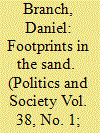

|
|
|
|
|
| Publication |
2010.
|
| Summary/Abstract |
Recent attempts to revive counterinsurgency strategies for use in Afghanistan and Iraq have been marked by a determination to learn lessons from history. Using the case of the campaign against the Mau Mau insurgency in Kenya of 1952-60, this article considers the reasons for this engagement with the past and the issues that have emerged as a consequence. The article disputes the lessons from British colonial history that have been learned by military planners, most obviously the characterization of nonmilitary forms of British counterinsurgency as nonviolent. Although it contests some of these supposed precedents for successful counterinsurgency in British military history, the article also identifies more generalizable elements of the Kenyan case. Particular emphasis is given to the effects on the nature of counterinsurgency, a reliance on locally recruited allies, and the decentralization of command.
|
|
|
|
|
|
|
|
|
|
|
|
|
|
|
|
| 10 |
ID:
131899
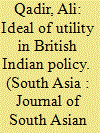

|
|
|
|
|
| Publication |
2014.
|
| Summary/Abstract |
The now natural ideal of defining higher education through its societal utility is a relatively recent historical formation, and in the case of South Asia, its construction is entangled with the colonial history of the institutionalisation of modern higher education in the nineteenth century. Drawing on Robert Young's history of the Bentham-inspired 'chrestomathic' University of London, this article reviews the shifting construction of practicality in British Indian higher education policy in the formative period between 1835 and 1904. The article underlines the continuities and ruptures over time in the policy rhetoric of utility as a normative ideal and points out some implications for understanding colonialism
|
|
|
|
|
|
|
|
|
|
|
|
|
|
|
|
| 11 |
ID:
152602


|
|
|
|
|
| Summary/Abstract |
The object of this thesis is to decipher and analyse India’s destiny, in the context of the struggle for freedom, in the first half of the twentieth century. The role and mission of Mahatma Gandhi, Netaji Subhas Chandra Bose and Dr. B.R. Ambedkar are central to our understanding of the developments, political and social, which culminated in India attaining political freedom in 1947.
|
|
|
|
|
|
|
|
|
|
|
|
|
|
|
|
| 12 |
ID:
121070
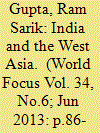

|
|
|
|
|
| Publication |
2013.
|
| Summary/Abstract |
This paper aims to understand the historical prospective of India and West Asia relations in the 21st century. From ancient to modern times, these regions had been in cultural, commercial and diplomatic contacts with each other. British colonialism had changed the nature of the relationship between these two regions. To protect their commercial and strategic interest in India, Britain colonized the West Asian region (Persian Gulf and Red Sea Region) and they established an Informal Empire in Gulf. Further these colonial policies were controlled through the British India Residency System which legitimized the ruler as the sheikh of the land and the people. The End of the nineteenth century and the beginning of twenty century witnessed the emergence of a new phase of interaction between the people and the leadership of India and West Asia. This new phase of relation between two regions had greater impact on shaping the future world politics. With the Arab Spring of recent times, India has a new role to play in this region.
|
|
|
|
|
|
|
|
|
|
|
|
|
|
|
|
| 13 |
ID:
046851
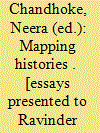

|
|
|
|
|
| Publication |
New Delhi, Tulika, 2000.
|
| Description |
viii, 443p.hbk
|
| Standard Number |
8185229163
|
|
|
|
|
|
|
|
|
|
|
|
Copies: C:1/I:0,R:0,Q:0
Circulation
| Accession# | Call# | Current Location | Status | Policy | Location |
| 044037 | 954/CHA 044037 | Main | On Shelf | General | |
|
|
|
|
| 14 |
ID:
163227
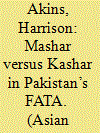

|
|
|
|
|
| Summary/Abstract |
In 2016, Pakistan introduced a five-year plan to repeal the Frontier Crimes Regulation of the Federally Administered Tribal Areas and integrate the region into the Khyber Pakhtunkhwa Province. The political conflict between mashar (elders), who are advantaged by the law, and kashar (youth), who are disadvantaged by it, has been an obstacle to reform. This article also demonstrates that this conflict has been an endemic feature of the law since its establishment by British authorities in 1901.
|
|
|
|
|
|
|
|
|
|
|
|
|
|
|
|
| 15 |
ID:
179987
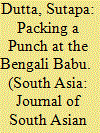

|
|
|
|
|
| Summary/Abstract |
The emergence of the bhadralok in the nineteenth century, typified by ‘genteel’ qualities and Western education, reflected changes in the nature of Bengali identity and subjectivity. The colonial experience resulted in an anxiety among elite Bengalis to define a social class for themselves that would delineate their gentility and shape a new code of ‘acceptability’. The ‘Babu’ came to be associated with this new class of Bengalis eager to adopt Western manners and learning who formed the greater part of the white-collar workers required in the cosmopolitan enclave of Calcutta. They were satirised, particularly in colonial discourse, for their imitation of English manners, attire and language. This article explores the shifting markers of gentility and the satiric representation of the Bengali Babu (and his Bibi) in the British satirical magazine, Punch, and its contemporary vernacular counterparts in colonial Bengal.
|
|
|
|
|
|
|
|
|
|
|
|
|
|
|
|
| 16 |
ID:
032642
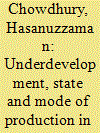

|
|
|
|
|
| Publication |
Calcutta, Minerva Associates (Publications) Pvt. Ltd, 1985.
|
| Description |
xi, 122p.hbk
|
|
|
|
|
|
|
|
|
|
|
|
Copies: C:1/I:0,R:0,Q:0
Circulation
| Accession# | Call# | Current Location | Status | Policy | Location |
| 026366 | 954.92/CHO 026366 | Main | On Shelf | General | |
|
|
|
|
| 17 |
ID:
168235


|
|
|
|
|
| Summary/Abstract |
In this article, Britain’s attitude towards Nigerians’ voluntary enlistment as combatants during the Second World War is studied. The historical method is deployed to interrogate previously untapped archival sources on the subject. Against the conventional wisdom, this micro-study posits Britain’s rebuff of Nigerians’ voluntary enlistment in order to preserve white supremacy by not arming and deploying Africans to fight Europeans. Nigerians protested the British treatment of the war as a white man’s war in which Africans had no significant role to play. Pressure on British manpower necessitated a policy reversal. Conscription was, thus, not due to Africans’ refusal to fight for Britain.
|
|
|
|
|
|
|
|
|
|
|
|
|
|
|
|
|
|
|
|
|